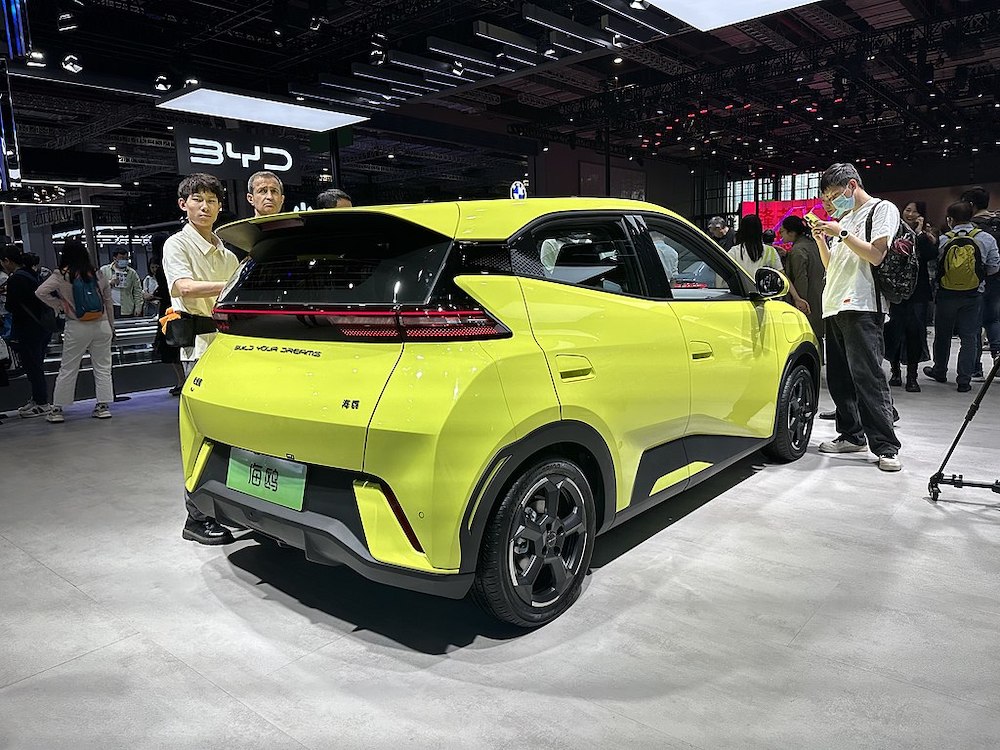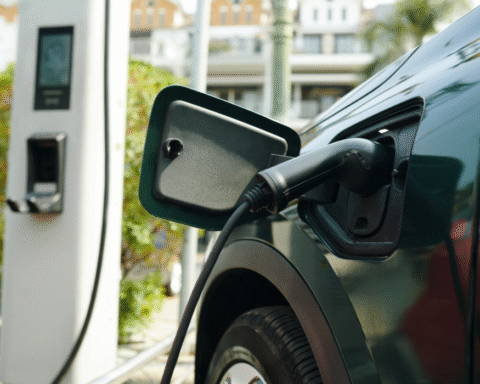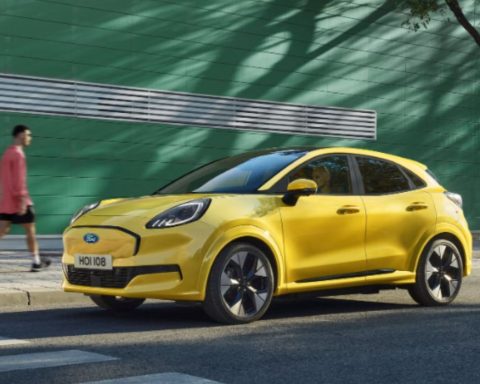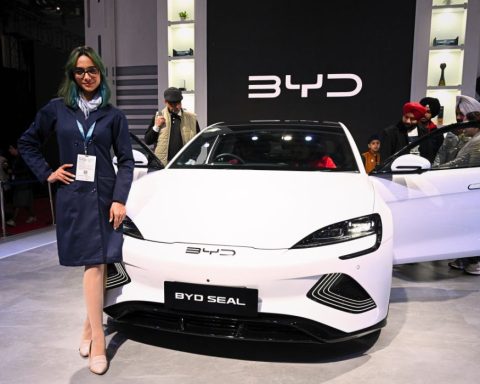Under pressure from the auto industry, Canada has added a 100% tariff to the price of all electric cars imported from China, with no price break for smaller models that could make EVs a practical, low-carbon option for millions of households that currently can’t afford them.
The announcement increases the existing tariff from 6.1 to 106.1% as of October 1, The Canadian Press reports. A separate 25% tariff on Chinese steel and aluminium products takes effect October 15.
“We are transforming Canada’s automotive sector to be a global leader in building the vehicles of tomorrow, but actors like China have chosen to give themselves an unfair advantage in the global marketplace, compromising the security of our critical industries and displacing dedicated Canadian auto and metal workers,” Prime Minister Justin Trudeau told media Monday, during a federal cabinet retreat in Halifax. “So, we’re taking action to address that.”
“We all know that China is not playing by the same rules as other countries,” he added. “Unless we want to get in a race to the bottom, we have to stand up and that’s what we’re doing.”
Trudeau said Canada is also looking at similar trade measures for Chinese-made products like “chips and solar cells,” iPolitics reports.
Monday’s decision mirrored tariffs imposed by the United States in May and the European Union in June, and coincided with a visit Sunday by U.S. National Security Advisor Jake Sullivan. The Canadian tariff applies to electric and some hybrid cars, trucks, buses and delivery vans.
“Chinese brands like BYD are not a major player in Canada’s EV market right now but imports from China have exploded in recent years as Tesla switched from U.S. factories for its Canadian sales to its manufacturing plant in Shanghai,” CBC reports. “The new tariff will apply to those Shanghai-made Teslas that are sold in Canada – a development that is expected to force the U.S. automaker to supply the Canadian market with vehicles made at one of its other plants in the U.S. or Europe instead.”
Deputy Prime Minister and Finance Minister Chrystia Freeland said the tariff was meant to protect the tens of billions of dollars governments have invested in domestic EV-manufacturing facilities.
“Canada is home to the talented workers, raw materials, clean electricity, and specialized production capabilities needed to build electric vehicles” but faces “an intentional, state-directed policy of overcapacity, undermining Canada’s ability to compete in domestic and global markets,” she said in a release. That called for “decisive action to level the playing field, protect Canadian workers, and match measures taken by key trading partners.”
The release said China’s annual EV exports have increased in value from $200 million in 2018 to $47.2 billion in 2023. It cited a BloombergNEF calculation that the country produces enough EV batteries to meet 100% of global demand.
Other recent analysis pointing to an “unprecedented rate” of global renewable-energy deployment has credited China with the lion’s share of that growth but expressed concern about a growing decarbonization divide between Asia and the rest of the world, and between China and the rest of Asia.
Fast action
The tariff decision came less than two months after Freeland announced a 30-day consultation to determine how to handle trade restrictions on Chinese EV imports. Canada is “facing unfair competition from China’s intentional, state-directed policy of overcapacity that is undermining Canada’s EV sector’s ability to compete in domestic and global markets,” she said.
At the time, CBC cited the average price of a Canadian EV at around $73,000, while the Seagull, produced by Chinese automaker BYD, costs around $13,000 on the domestic market. The Seagull is so inexpensive because it is manufactured to reduce costs – its small size alone means it can be produced with fewer materials and travel farther on a smaller battery. BYD has also cut down on extraneous parts; the car has only one front wiper and no rear wiper, so the company “only has to manufacture one wiper arm, one wiper motor, and one wiper blade,” Inside EVs wrote earlier this year.
Critics say other factors are also at play, including heavy subsidies by the Chinese government and low wages for autoworkers, which together help to artificially lower prices and compete unfairly against Western EV companies.
But still, the fast turnaround on the tariff announcement caught the eye of some observers who implied that the outcome of the consultation had been determined before it began. A senior federal official told media the tariff had been under study for months and was not prompted by pressure from the U.S., CBC writes.
Fair market or missed opportunity?
The Automotive Parts Manufacturers’ Association had lobbied for U.S.-style tariffs in Canada, and its president Flavio Volpe said Ottawa had “stepped up again” for the industry. “It’s very important for us to have a level playing field,” he told CBC. “The Chinese are very good at what they do, but what they do also includes breaking the rules.”
But that comment didn’t fully capture some of the praise China is receiving for massively improving its automotive product over the last five years. The Chinese vehicles are “amazing quality. Just amazing,” the equivalent of a Tesla Model S with “90% of Tesla’s capability – for half of the price,” wrote RethinkX co-founder Tony Seba in mid-June. “No company in the West can compete with this. No company in Japan can compete with this.”
It isn’t even that a model like the Seagull would be priced the same in Canada as it is in China –rather than trying to flood the market, Chinese automakers’ practices in Europe suggest they’re aiming for sales margin over volume, charging the equivalent of $35,000 or $45,000 for a car that would sell for US$17,000 at home, Corporate Knights CEO Toby Heaps and research director Ralph Torrie wrote in a Globe and Mail op-ed earlier this month.
But companies like BYD, unlike many of their Western counterparts, are still putting smaller, more affordable cars on the market, rather than emphasizing pricier zero-emission trucks and SUVs. That difference had Marc-André Viau, government relations director at Montreal-based Équiterre, suggesting a more modest tariff – in the range of 17% to 38%, as in Europe, rather than 100%, as in the United States. He urged Ottawa to structure the surtax to reflect differences in environmental standards and working conditions, but also to favour the smaller vehicles that Canadian buyers need and want.
‘Verge of extinction’
“People who are in the market for an affordable new vehicle have almost no options left,” since “small, low-cost models have been on the verge of extinction for about 10 years,” Viau wrote. An excessively high tariff, he warned in mid-August, would miss the opportunity to stimulate healthy competition to build small, affordable cars in North America.
Heaps and Torrie made much the same point. Affordable electric cars from Chinese companies like BYD “could open up the Canadian EV market to millions of middle-class families,” they said. “The electricity needed to charge those cars will generate cash flow for Canadian utilities, helping them prepare for the growing role of electricity in our energy system.” And with the vast majority of the cars currently manufactured in Canada destined for export, concerns about domestic job loss have been exaggerated.
“We buy all sorts of things from China, why should electric vehicles be an exception?” Torrie asked in an email Monday. “Every combustion vehicle bought today will be emitting greenhouse gas emissions well into the 2030s. We cannot get at the root cause of the fires and floods and the heat waves if we keep trumping climate change in our policy decisions.”
RELATED:
Canadians want EVs they can afford – China has them. Let them in. [Torrie/Heaps]
Electrifying driving in Canada will cost just 10% more than what we already spend
GREEN house effect: Calculate the savings from electrifying your home
On Monday, Clean Energy Canada said the tariff would make the transition off carbon more costly and difficult.
“Unfortunately, Canada made a decision today that will result in fewer affordable electric vehicles for Canadians, less competition, and more climate pollution,” director of public affairs Joanna Kyriazis told CBC. “Not only could today’s announcement have a chilling effect on future EV sales, it could drive up EV prices and slow adoption in the near term as well.”
CBC cites Volpe pointing to coal-fired generating stations that still power manufacturing in China, while Freeland cited the country’s “abysmal” labour and environmental standards. In their Globe and Mail op-ed, Heaps and Torrie said those realities “must be taken seriously.” But “it is already illegal to import products tainted with forced labour,” even if Canada has never applied that standard against any product.
The solution, they said, is that “this law should be enforced at the individual company level, rather than by a tariff that would shut out any Chinese-made EV, including those made in China by Western carmakers like Tesla, Honda and General Motors.”
This article originally appeared in The Energy Mix. Read the original article here. It has been edited to conform with Corporate Knights style.







